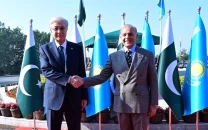Govt defers decision to hike wheat support price
ECC approves plan to book Rs72.5 billion circular debt in budget of this fiscal year

The federal government has deferred a decision to increase the minimum wheat support price by 25% to Rs1,745 per 40 kilogramme for next crop due to disagreement among the federal ministers and the provincial governments.
The Economic Coordination Committee (ECC) of the Cabinet will take up the issue again for a decision on Monday as the discussions at the ECC meeting on Wednesday could not be concluded due to a half-baked summary presented by the Ministry of National Food Security and Research.
Chaired by Adviser to Prime Minister on Finance Dr Abdul Hafeez Shaikh, the ECC approved a plan to book Rs72.5 billion circular debt in the budget of this fiscal year.
In violation of the Rules of Business 1973, the Ministry of National Food Security and Research brought the wheat support price increase summary in the ECC without making it part of the official agenda.
It has become a routine of the food ministry to table important and sensitive summaries at the eleventh hour in the ECC meetings without circulating these among the ministries concerned.
So much so, the Ministry of Finance also did not mention deliberations over the wheat support price in its official handout issued after the meeting. The wheat support price is the rate at which the government procures the commodity from farmers.
The Ministry of National Food Security proposed to increase the wheat support price for 2021 crops from current Rs1,400 per 40 kg to Rs1,745 – an increase of Rs345 or 24.6%, sources told The Express Tribune.
Some of the ministers were against the proposal of increasing the prices due to its adverse impact on wheat flour rates, which have already increased by more than 50% during the first two years of the tenure of Prime Minister Imran Khan’s government.
“There is a need to strike a balance between the interests of consumers and farmers,” said Federal Minister for Planning and Development Asad Umar, while talking to The Express Tribune.
According to various studies, 10% increase in wheat support price leads to an increase of 2% to 3% in overall inflation.
There was also disagreement among the provinces over the wheat support price. Punjab – the largest producer of wheat – wanted that the prices should be Rs1,650 per 40 kg while Sindh – the second largest producer, did not give a price.
The Khyber Pakhtunkhwa (K-P) government wanted Rs1,800 and Balochistan was in favour of Rs1,745 price. The Food Ministry summary lacked details about the possible impact of the increase in wheat support price on cultivation area and public procurements, said the officials.
The ECC would now again take up the issue on Monday.
For this season’s crop, the federal government had increased the wheat procurement price from Rs1,300 to Rs1400 per 40kg, an increase of 7.7% while the procurement price in India increased from equivalent of Rs1,501 to Rs1648 per 40kg, an increase of 10%.
Price of wheat in Afghanistan is equivalent to Rs2,470 per 40kg.
As against Rs1,400 minimum support price, the wheat is available on an average of Rs2,200 per 40kg.
For this season, the government had set the wheat procurement target at 8.25 million ton against which only 6.2 million tons could be procured from the farmers, which was 25% less than the goal.
The government is in the process of importing about 1.65 million metric tons wheat to bridge the shortfall, largely created due to its decision to export 5.5 million tons wheat and its products.
Kashmir campaign budget
On a summary moved by the Ministry of Information for allocation of additional funds for paying for the media campaigns launched on August 5 – Kashmir Siege Day, the ECC decided that the ministry may meet the immediate fund requirement through re-appropriation from its budget allocated for the financial year 2021.
Any shortfall due to re-appropriation of the funds would be met through technical supplementary grants towards the end of the current financial year, said the Finance Ministry handout.
Pakistan had observed August 5 as Kashmir Siege Day and spent Rs13.4 million on publicizing the atrocities by India through local and international press.
Pakistan’s foreign missions spent Rs3.7 million, mainly by the Washington Mission. The information ministry had given Rs9.7 million advertisements in the local press. The ministry was of the view that it was already short of funds due to less allocations as compared to the indicative budget ceiling of Rs9 billion.
Karkey RPP
The Ministry of Energy requested the ECC to give directions for the settlement of a loan of about Rs7.6 billion and its associated costs from the National Bank of Pakistan (NBP) in relation to advance payment for Karkey Karadeniz Elektrik Uretim.
The ECC decided that the finance division should engage with the NBP for the settlement of the loan. It was decided that a well-rounded proposal with all stakeholders on board would be presented before the ECC for the final approval, said the official handout.
The loan had been obtained by executing a Syndicated Finance Agreement between Lakhra Power Generation Company and the NBP in May 2009 at KIBOR plus 2.15% interest rate against sovereign guarantees by the Ministry of Finance.The NBP had called the sovereign guarantees after the Lakhra power company and Karkey defaulted on their loan repayments. Karkey had also filed an arbitration suit against Pakistan in the International Centre for Settlement of Investment Disputes (ICSID).
Subsequently, Pakistan and the Karkey reached a settlement agreement and both the sides decided to withdraw suits against each other.
Circular debt
The ECC in principle approved technical supplementary grant amounting to Rs72.635 billion to the Power Holding Limited (PHL) for onward disbursements to respective banks or through financial instruments as and when due during the current financial year.
The Ministry of Finance will make these Rs72.6 billion repayments of the principal loans from June 30, 2020 to June 2021. The next installment of Rs4.2 billion is due on November 4.
The ministry noted that the Rs72.6 billion payment “will be treated against outstanding power sector subsidy claims on part of the government of Pakistan under the respective heads”. In an earlier decision, the ECC had decided to shift the power sector debt stock of Rs804 billion to public debt.
The ECC also formed a committee headed by Adviser to the PM on Institutional Reforms Dr Ishrat Hussain and comprising Dr Waqar Masood Khan and representatives of the finance and power divisions.
The committee will prepare a proposal for the settlement of dues of the power sector and other related issues in a holistic manner for onward submission to the ECC.
In May this year, the ECC had approved to shift Rs804 billion stock of the circular debt to the government books under a condition of the International Monetary Fund (IMF).
The ECC on Wednesday modified an earlier decision of making Rs136.5 billion circular debt repayment in the last fiscal year. It said the circular debt “will be paid as and when due instead of fiscal year 2019-20”.
In the new summary, the decision of making Rs136.5 billion repayment in 2019-20 was referred to as “inadvertently”. However, in its May 2020 summary, the decision to return the Rs136.5 billion had been made because it was the “most expensive loan”.
The Rs136.5 billion loan has been contracted at three-month KIBOR plus 2% interest rate.
It allocated Rs10 billion from Stimulus Package for the payment of 1st installment of interest/profit for the period of 21-05-2020 to 20-11-2020 in respect of Pakistan Energy Sukuk-II amounting Rs200 billion.



















COMMENTS
Comments are moderated and generally will be posted if they are on-topic and not abusive.
For more information, please see our Comments FAQ